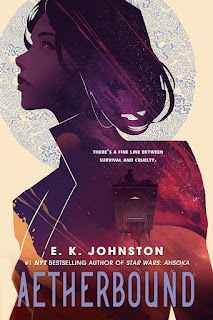No E. K. Johnston book is like any other book in existence, including any other E. K. Johnston book. She has very specific stories to tell, and each book is told in the just right way for that story, which probably won't conform with any standard structures or tropes you're familiar with. So you have to come to each new book with an open mind and trust that Johnston is going to give you the story you need that you didn't even know you needed.
All that is preamble to say I didn't know I needed a retelling of the Fisher King myth, set in space with magic, but now my heart is wrung and my mind is slightly blown and I'm not sure how to review it. (Full disclosure: I have only the vaguest understanding of the Fisher King myth, and a quick google search is not helping me understand it any better; I didn't recognize this as a retelling until a reviewer mentioned it, even though Johnston specifically tells the Fisher King story in the middle of the book!) (To achieve healing you have to ask the right question—that's as far as my understanding goes.)
Right. The review. There's some harsh stuff in this book, no doubt about it, and it's very spoilery to tell you what it all is, but if you're concerned my Goodreads review has the spoilers. The reason you don't want to be spoiled is that we start with Pendt as a five-year old to whom all this is normal, and we only gradually discover, along with her, that it's unbearable. This is a book about autonomy, freedom, choice, and I think it's important to be in Pendt's head as she grows into a person who can make choices, who sees her opportunity and escapes, and sees her next opportunity and grabs it. I think the first section of the book is brilliant in the way Johnston controls POV so that we are a little appalled, then more appalled, then fiercely excited and terrified when Pendt escapes. (That's not a spoiler: it's on the book jacket!)
Then we get part 2, and another set of characters who are imprisoned in an entirely different way. The way Pendt's need to escape leads to a unique solution to all of their dilemmas is weird and strangely affirming. And all that is told as more of a background to the developing friendship among three young people who are essentially good and kind and trying to do the right thing in a very twisted universe.
One of the things I love about E. K. Johnston is her ability to portray goodness and kindness. In the end, I think that's what all her books are about, and the plots are just vehicles, scenarios in which goodness and kindness can play out. All the more highlighted when the universe is so completely the opposite of good and kind. I can't tell you how much I love Pendt and Ned and Fisher! (And there had better be a sequel, because that Stavenger Empire needs to be taken down!)(She hints at a sequel at the end, so here's hoping!)
Johnston's pacing is always odd, because she tells you what you need to know when you need to know it, and only shows you the things she thinks are important. Things can seem rushed and abrupt because she trusts her readers to keep up. She's doing it all very deliberately, so pay attention to where she spends her narrative time. (She definitely doesn't tell the story that most authors would tell and most readers would expect.) I need to reread and pay more attention myself to see all I missed the first time around.
Oh, and don't ask what the LGBTQ+ rep is, because you don't want to be spoiled! I thought the way she dealt with this particular character was quite brilliant and fun, and also very pointed. (It's never explicitly stated, because it shouldn't have to be.)
This isn't a book for everyone: the reviews will tell you that! But if you've liked more than one of Johnston's books (or if you like Patrick Ness—he's maybe the only comparable author out there*), and you're willing to go along for a very interesting ride, I can highly recommend this. (I think it's my second favourite of her books, after Exit, Pursued by a Bear.)
*If Johnston and Ness ever collaborated on a project, I'm pretty sure the universe would collapse into a singularity from so much originality and depth.
Cross-posted on Goodreads, and I should really post my other E. K. Johnston reviews there too.





